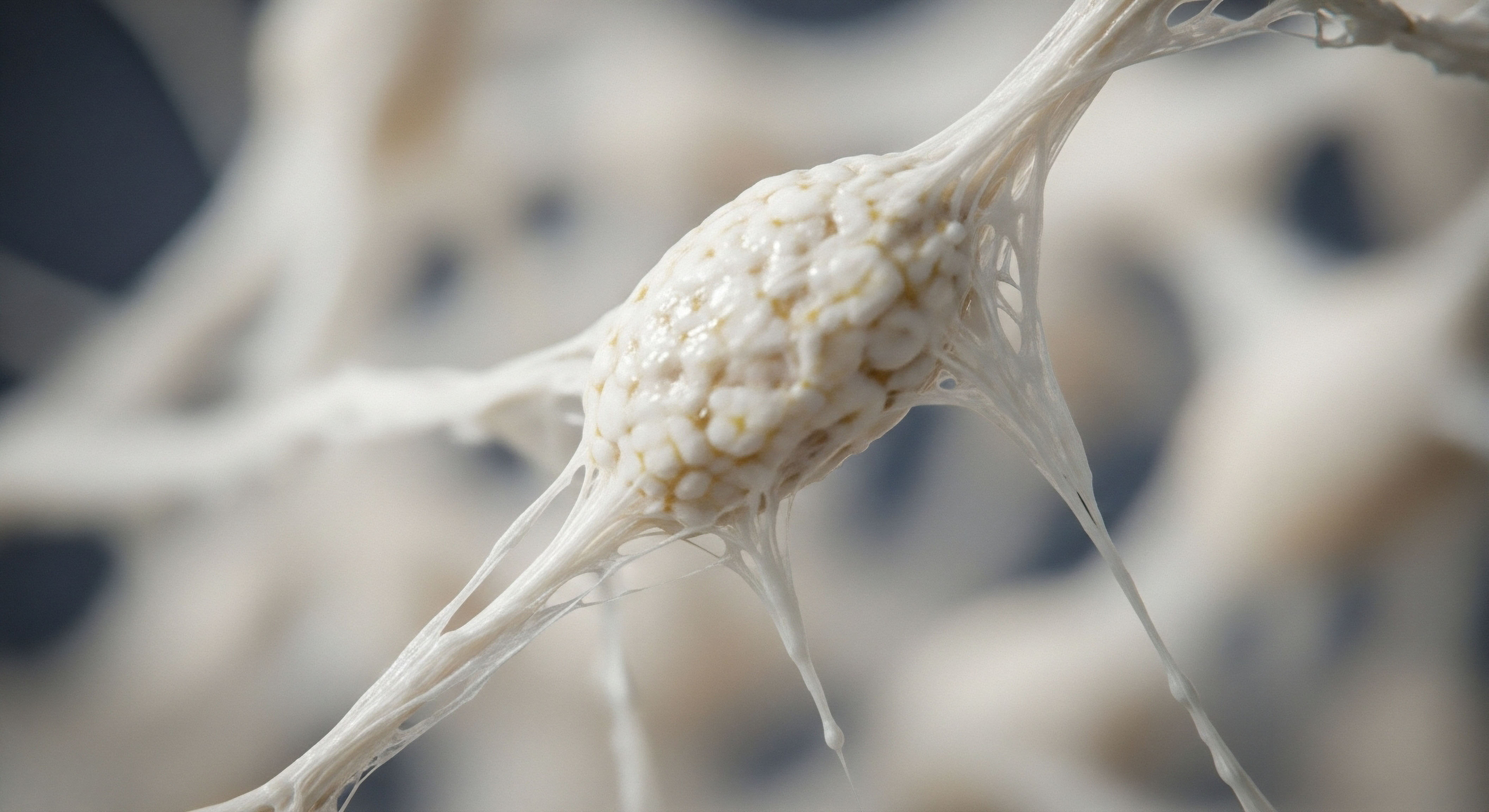

Metabolic Signaling ∞ The Inner Command Center
The human system functions as a high-performance machine, constantly receiving and interpreting directives. These directives often arrive in the form of hormones, chemical messengers governing every biological process from sleep cycles to muscle synthesis, mood regulation to energy expenditure. Our environment provides a continuous stream of these signals. The most potent, consistently available signal resides within our daily dietary choices.
Food transcends mere sustenance. It stands as a sophisticated biological programming language, capable of dictating the precise operation of our endocrine system. Each meal presents an opportunity to issue clear instructions to the body’s intricate network of glands and receptors. Misalignment here leads to systemic disarray, manifesting as fatigue, compromised body composition, or diminished cognitive sharpness. Optimal alignment yields a state of biological coherence.
Consider the immediate effects of macronutrient ratios. Protein supplies the foundational amino acids essential for peptide hormone synthesis. Healthy fats deliver the cholesterol precursors vital for steroid hormone production, including testosterone and estrogens. Carbohydrates, when precisely timed and sourced, regulate insulin sensitivity, a key determinant of nutrient partitioning and metabolic health. These components do more than supply energy; they actively participate in the creation and regulation of the very molecules that govern our vitality.
“Clinical data confirms specific dietary interventions can shift endogenous hormone production by up to 20% within weeks, profoundly impacting energy and physiological function.”
Beyond macronutrients, the micronutrient profile of our diet wields considerable sway. Zinc, for example, serves as a cofactor in testosterone synthesis and insulin signaling. Magnesium supports hundreds of enzymatic reactions, many directly influencing stress hormone regulation and sleep architecture. Selenium plays a role in thyroid hormone conversion, directly influencing metabolic rate and energy output. These trace elements are not ancillary additions; they represent essential tools for the body’s internal chemists.
The gut microbiome also emerges as a significant modulator of endocrine function. Gut bacteria influence estrogen metabolism, produce short-chain fatty acids affecting insulin sensitivity, and even synthesize neurotransmitter precursors impacting mood and stress response. A thriving gut environment supports hormonal equilibrium. Dysbiosis, a state of microbial imbalance, creates systemic inflammation and disrupts these delicate feedback loops. This connection underscores the body’s interconnectedness, a system where the health of one component profoundly impacts another.


Precision Nutrition ∞ Engineering Endocrine Balance
Mastering the body’s internal chemistry demands a calculated approach to nutrition. This involves moving beyond conventional dietary wisdom and adopting a strategic framework. We view the plate as a control panel, each component a lever for precise biological adjustment. The goal is to calibrate the system, not simply to feed it.

Strategic Macronutrient Ratios
Protein intake requires prioritization. It delivers the building blocks for hormones and neurotransmitters, alongside supporting lean muscle mass. Aim for a consistent supply of high-quality protein across meals. Healthy fats, particularly monounsaturated and omega-3 fatty acids, provide the raw materials for steroid hormone synthesis.
Their inclusion supports cell membrane integrity, crucial for receptor function. Carbohydrate management presents a critical area for influence. Timing carbohydrate consumption around physical activity enhances insulin sensitivity, directing glucose to muscle cells rather than adipose tissue. Intelligent carbohydrate sourcing, prioritizing whole, unprocessed forms, minimizes rapid blood glucose spikes and subsequent insulin surges.

Micronutrient Density as a Mandate
The modern diet frequently falls short on essential micronutrients. Supplementation with targeted compounds becomes a necessity for many seeking optimal endocrine function.
- Vitamin D ∞ Crucial for testosterone production and immune regulation.
- Magnesium ∞ Involved in over 300 enzymatic reactions, including those for stress response and sleep.
- Zinc ∞ Supports thyroid and sex hormone synthesis.
- Iodine ∞ Essential for thyroid hormone production.
- B Vitamins ∞ Cofactors in numerous metabolic pathways influencing energy and neurotransmitter synthesis.
These elements serve as catalysts, ensuring the intricate biochemical reactions underpinning hormone creation proceed without impediment. Their consistent presence ensures biological machinery operates at full capacity.
“Elevating magnesium intake to clinically recognized optimal levels has demonstrated improvements in cortisol rhythmicity and sleep efficiency, a direct influence on hormonal restoration.”

Meal Timing and Circadian Synchronization
The timing of meals profoundly impacts hormonal rhythm. Aligning eating patterns with the body’s natural circadian clock optimizes digestive function and hormone secretion. Intermittent feeding strategies, such as time-restricted eating, provide periods of metabolic rest, enhancing insulin sensitivity and promoting cellular repair mechanisms. This strategic withholding of food sends powerful signals to growth hormone and insulin pathways, creating a favorable metabolic environment.

Gut Health ∞ The Hormonal Nexus
Maintaining a robust gut microbiome offers direct benefits for hormonal regulation. Probiotic-rich foods and targeted prebiotics support beneficial bacterial populations. This promotes the healthy elimination of excess estrogens, reduces systemic inflammation, and aids in the synthesis of short-chain fatty acids that protect metabolic function. Addressing gut dysbiosis, through dietary modifications and targeted interventions, removes a significant impediment to endocrine balance.


Phased Adaptation ∞ Orchestrating Biological Rhythms
The application of nutritional science to hormonal mastery requires a dynamic approach. The optimal dietary strategy adapts to individual goals, current physiological state, and the passage of time. This represents a continuous process of refinement, a commitment to ongoing biological tuning.

Performance and Recovery States
For individuals pursuing peak physical performance, nutrient timing around training sessions holds considerable sway. Pre-workout nutrition primes the system, providing substrates for energy and minimizing catabolism. Post-workout intake focuses on protein and carbohydrates to replenish glycogen stores and initiate muscle protein synthesis, directly influencing growth hormone and insulin responses. The strategic consumption of specific amino acids can further support recovery and anabolism.

Body Composition Recalibration
Achieving a desired body composition, whether reducing adipose tissue or building lean mass, relies heavily on precise hormonal signals. For fat loss, managing insulin sensitivity through controlled carbohydrate intake and extended fasting windows becomes paramount. This promotes fat oxidation. For muscle accretion, a consistent supply of amino acids alongside adequate energy supports anabolic pathways. Dietary fats remain critical for supporting steroid hormone production, even during periods of caloric restriction.

Cognitive Acuity and Mental Drive
The brain, an organ with high metabolic demand, responds acutely to dietary inputs. Stable blood glucose levels, achieved through balanced meals and minimal processed foods, prevent cognitive dips. Adequate intake of omega-3 fatty acids supports neuronal membrane health and neurotransmitter function, directly influencing mood, focus, and memory. Micronutrients such as B vitamins and choline contribute to acetylcholine synthesis, a neurotransmitter critical for learning.

Longevity and Age-Related Adjustments
As we age, the endocrine system undergoes natural shifts. Dietary strategies gain heightened significance in mitigating age-related hormonal decline. Prioritizing protein maintains muscle mass, counteracting sarcopenia. Supporting mitochondrial function through specific antioxidants and polyphenols protects cellular energy production. Intermittent feeding strategies may extend periods of cellular autophagy, a process linked to cellular renewal and longevity. These interventions serve to preserve physiological function, extending the period of peak vitality.
The journey toward hormonal mastery is iterative. It involves consistent self-assessment, informed adjustments, and a commitment to understanding the body’s responses. Biomarker analysis, including blood panels for key hormones, metabolic markers, and inflammatory indicators, provides objective feedback. This data-driven approach allows for precise calibration, ensuring dietary interventions yield the intended physiological outcomes.

Your Biological Sovereignty Achieved
The profound truth persists ∞ the power to command your internal chemistry resides within your grasp. Each meal represents a deliberate choice, a programming instruction for your entire endocrine system. You hold the ultimate authority over your biological state. This knowledge transcends passive acceptance of physiological norms. It provides the tools for proactive optimization, for sculpting a body and mind capable of sustained, exceptional output.
Embrace this control. Understand the language of your cells. Direct your internal systems with intention. The journey to hormonal mastery defines a path toward unparalleled vitality, a state where every biological function aligns with your highest aspirations. This level of self-governance defines true freedom within your own biology.



